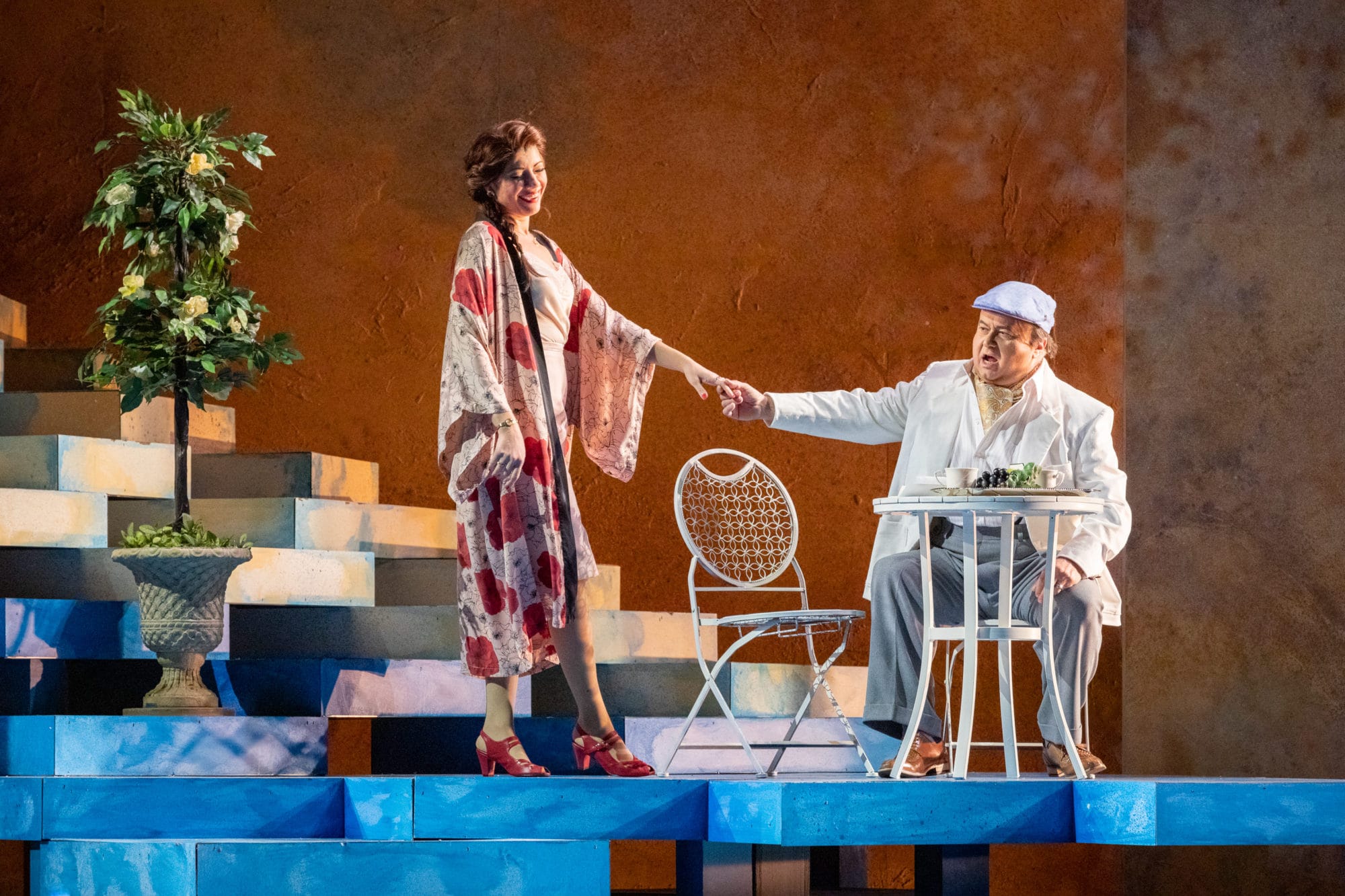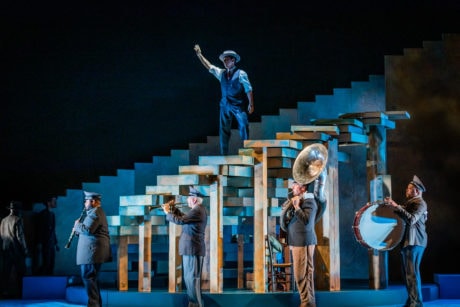Virginia Opera’s artistic director Adam Turner, in his program note for contemporary composer Daniel Catán’s Il Postino, hastens to assure audiences that the company is working to dispel myths about “scary modern music.” In meeting this objective, the piece succeeds admirably. Catán’s music is melodic, lyrical, and bursting with orchestral color. His libretto is full of poetry, young and mature love, and, of course, tragic death. Virtually all commentators on the opera have likened its attractions to those of Puccini, and someone whose experience and preferences lean toward Butterfly or Boheme would find nothing vaguely threatening or even surprising here.

In the story, great Chilean poet Pablo Neruda (Raul Melo), exiled from his country because of his Communist politics, winds up on a fictional Italian island, on an equally fictional timeline. (Catán wrote the role for Plácido Domingo who, ironically, has now been effectively exiled from the American opera scene because of sexual misconduct allegations.) There he meets the title character, shy, uneducated, tongue-tied local postman Mario Ruoppolo (Daniel Montenegro), in love with the barmaid Beatrice Russo (Danielle Talamantes). Rather like Cyrano providing Christian with flowery words with which to woo Roxane, Neruda lends Mario love poems to capture Beatrice’s heart.
Both Neruda and Mario are tenor roles, and Catán skillfully contrasts their musical characters. Mario is a fairly light lyric tenor, while Neruda, fitting Domingo’s later-career sound, has a lower, darker tone, sometimes verging on baritone. Melo and Montenegro work well together vocally in their scenes, though more than once one had to strain to hear the latter over the orchestra and the former’s lower range sometimes lacked power. Montenegro saved Mario’s best vocal moment for last, as he sings the touching letter he has left for Neruda at the opera’s conclusion.
Neruda’s words inspire Mario, both in his pursuit of his love and in his political awakening. Melo’s stolid acting as Neruda felt less inspirational than his character’s words, his strongest moment coming early in his rapturous love song “Desnuda” (nude), based on a Neruda poem, in praise of the loveliness of his wife Matilde (Inna Dukach). In contrast to the original Los Angeles production, in which the character is topless in the scene, Virginia Opera’s Matilde is considerably less “desnuda,” more decorous but rather at odds with the lyric.
Montenegro’s Mario sweetly gains confidence, with Neruda’s assistance, as he gains Beatrice’s hand. He plays very effectively Mario’s sadness and bewilderment when Neruda, released from exile and once more globe-trotting to great acclaim, seems to have forgotten him.
Dukach and Talamantes, both sopranos, were in excellent vocal form, as was the third major female character, Beatrice’s aunt Donna Rosa (Dana Beth Miller). A strong, agile mezzo-soprano, with vocal color to burn, Miller had the greatest opportunity of any of the female principals to create a vivid character. Both comically protective of Beatrice’s virtue and more perceptive of political and social class reality than the opera’s other characters, her Donna Rosa was the most interesting person on stage. She also had the funniest moment of the afternoon, as she and the local priest get into a briefly riotous dance during the wedding scene. In contrast, Matilde and Beatrice, in Catán’s writing, were little more than sources of the “eternal feminine” allure of women to their lovers.

Il Postino had a strong supporting cast, notably baritones Eferain Solis as an oily local politician and Brett Brode as Mario’s post office colleague. The oddest note in the production was the sporadic appearance of a trio of female dancers, moving slowly through a series of poses. In her program note, director Crystal Manich explains their purpose as being to represent the emotional awakening of female desire and the aesthetic of Neruda’s passion for music. A fine intention, perhaps, but not one that landed; the group seemed mostly a puzzling distraction.
As a company that produces each of its shows in Richmond and Hampton Roads as well as Fairfax, Virginia Opera must necessarily create settings that can be transported readily among its venues. Even making allowances for that necessity, as well as likely budget limitations, the physical production of Il Postino was unimpressive. The main set piece, designed by Liliana Duque Pineiro, was a curved, stepwise series of wooden platforms that rotated on a turntable. Suggesting nothing of a 1950s Italian fishing village, its movement facilitated smooth scene changes but became noticeably repetitious.
One key feature of the set was a bicycle anchored to the floor, with pedals but not wheels that move. Mario rides it in place frequently during the production. Could it have been intended as a metaphor for the life of a character who often seems to be going nowhere? But then sometimes a bike is just a bike. Tlaloc Lopez-Watermann’s upstage projections were mostly fairly commonplace cloudscapes, seascapes, and manuscript-like representations of Neruda’s writings, the latter not ideally clear in many cases.
It is always gratifying to see relatively new work (the opera made its debut in 2010) that is competently written and performed. Such, in addition to a generous helping of well-sung and played melody, is the satisfaction of Il Postino.
Running Time: Two hours and 45 minutes, with one intermission.
Il Postino, presented by Virginia Opera, completed its run at the George Mason University Center for the Arts on November 17, 2019. For tickets to upcoming Virginia Opera productions, go online.
Read David Siegel’s interview with Virginia Opera Artistic Director Adam Turner here.




